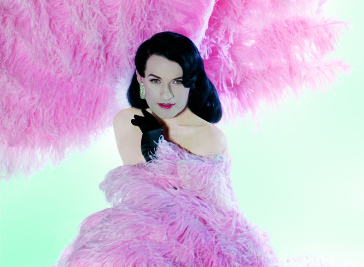Kevin Clarke
Operetta Research Center
24 July, 2015
It’s a ultra-pink birthday today, and a reason for the operetta world to celebrate one of its greatest divas of recent years: Christoph Marti aka Ursli Pfister. The man who put Im weißen Rössl back into circulation in 1994, who brought Clivia back to life (and how!), who lifted Gräfin Mariza off the ground with a spell-binding performance as Fürstin Božena Guddenstein zu Clumetz, who will be part of a Spoliansky revue at the Komische Oper next season, who gave a new meaning to the word “glamour” as Zaza in La Cage aux Folles and as Dolly Levi, the man who has always been an out-and-out advocate of operetta, together with his husband Tobias Bonn, who has always battled to take the genre seriously in all of its kitsch and camp glory, turns 50 today.

Christoph Marti as Zaza in “La Cage aux Folles” in Munich. (Photo: Theater am Gärtnerplatz)
At least that’s what Wikipedia claims, and just for once we are willing to believe them when they write Christoph Marti was born on July 24, 1965, in Bern. He founded the cabaret group Geschwister Pfister together with his partner, Mr. Bonn, and conquered the hearts of many people as Ursli opposite Bonn’s Toni Pfister and the one-and-only Fräulein Schneider of Andreja Schneider. Together with a group of friends they wrote operetta history in 1994 when they presented a small-scale cabaret version of Im weißen Rössl at the Bar jeder Vernunft in Berlin: Camilla Spira sat in the front row for opening night, together with Helga Benatzky, and they all applauded. As did the press. It was a veritable rediscovery of a forgotten gem, that had been written off as old fashioned and unplayable, but that has been galloping across stages worldwide ever since 1994, often in the performance edition of the Bar jeder Vernunft. Luckily, a live film version of the performance has been made and is available on DVD. It preserves for eternity a landmark production that has rightfully been included in a recent DVD edition of “Great 20th Century Theater Classics.”
There have been many operetta-like moments in the various Geschwister Pfister shows after 1994, but it was not until the Komische Oper – after years of battling for this – put on Nico Dostal’s Clivia at the Pfister’s request that all three were back together in an operetta. The pull-all-the-stops-out production immediately became one of the greatest hits in the Komische Oper repertoire. And Christoph Marti in the title role showed the world what a diva of the Gitta Alpar caliber should look and act like – and possible even sing like. With his husky baritone voice, and seductive whistling, Marti transformed the soprano role of Clivia, originally written for Lillie Claus in the Alpar coloratura style, into something uniquely his own, which is always the true test of greatness.
Stop! We forgot one earlier operetta production that had all three Geschwister Pfister, of course. The three performers starred together in Cologne in Csardasfürstin, which was Marti’s first excursion into operetta territory in a female lead role. Yvonne Kalman had to be convinced that this was a good idea, but she has not regretted giving her permission and has become an ardent fan (and friend) of the trio ever since.
Obviously, there would be a trillion operettas suited for their style and personalities, whether it’s Frau Luna with its Goddess of the Moon, tongue-in-cheek Berlin native Steppke and the down to earth landlady Frau Pusebach. (Rumor has it that this show might come to Berlin soon, at the Bar jeder Vernunft, but without the Pfisters … unbelievable enough) Next up is a Spoliansky revue. And then: we have to wait for what further goodies Kosky and Christoph Marti have in store.
We here at ORCA can only pray for as many chances to see Mr. Marti in as many operetta (and musical comedy) roles as possible.
Together with Dagmar Manzel and Katharine Mehrling – who joined the crusade much later – Marti has shown operetta fans in Berlin in the dismal post-Metropoltheater years what heights of glory are possible in that genre. It is always difficult to get back to today’s standard operetta fare after having witnessed a Christoph Marti performance.
A very happy birthday, dear Christoph. As Kiri te Kanawa said during her 50th birthday concert at the Royal Albert Hall, many moons ago: “Fifty is nifty!” She then went on to sing “I want to be a prima donna” from Victor Herbert’s The Enchantress. If anything, you are a prima donna in the truest and most enjoyable sense of the word, and I look forward to the future projects you will bless us with, from Abraham to Zeller – and anything in between.

Thank you for making Christoph more familiar to the English-speaking audience. I agree the attention is well-deserved. He is an extremely dedicated and passionate proponent of both operetta and pop music (forgotten or not) and brings to all his projects great joy, humor and verve. Such a pleasure to watch, I never miss the opportunity!